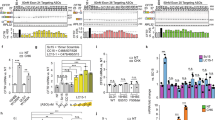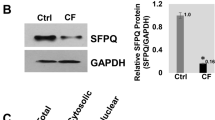Abstract
The major purpose of the present study was to quantify correctly spliced CFTR transcripts in human nasal epithelial cells from cystic fibrosis (CF) patients carrying the splicing mutations c.580-1G>T (712-1G>T) and c.2657+5G>A (2789+5G>A) and to assess the applicability of this model in CFTR therapeutic approaches. We performed the relative quantification of CFTR mRNA by reverse transcription quantitative PCR (RT-qPCR) of these splicing mutations in four groups (wild type, CF-F508del controls, CF patients and CF carriers) of individuals. In addition, in vitro assays using minigene constructs were performed to evaluate the effect of a new CF complex allele c.[2657+5G>A; 2562T>G]. Ex vivo qPCR data show that the primary consequence of both mutations at the RNA level is the skipping of their neighboring exon (6 and 16, respectively). The CFTR minigenes results mimicked the ex vivo data, as exon 16 skipping is the main aberrant transcript, and the correctly spliced transcript level was observed in a similar proportion when the c.2657+5G>A mutation is present. In summary, we provide evidence that ex vivo quantitative transcripts analysis using RT/qPCR is a robust technology that could be useful for measuring the efficacy of therapeutic approaches that attempt to achieve an increase in CFTR gene expression.
Similar content being viewed by others
Log in or create a free account to read this content
Gain free access to this article, as well as selected content from this journal and more on nature.com
or
References
Krawczak M, Thomas NS, Hundrieser B et al: Single base-pair substitutions in exon-intron junctions of human genes: nature, distribution, and consequences for mRNA splicing. Hum Mutat 2007; 28: 150–158.
Cartegni L, Chew SL, Krainer AR : Listening to silence and understanding nonsense: exonic mutations that affect splicing. Nat Rev Genet 2002; 3: 285–298.
Baralle D, Lucassen A, Buratti E : Missed threads. The impact of pre-mRNA splicing defects on clinical practice. EMBO Rep 2009; 10: 810–816.
Beck S, Penque D, Garcia S et al: Cystic fibrosis patients with the 3272-26A→G mutation have mild disease, leaky alternative mRNA splicing, and CFTR protein at the cell membrane. Hum Mutat 1999; 14: 133–144.
Raponi M, Baralle D : Alternative splicing: good and bad effects of translationally silent substitutions. FEBS J 2010; 277: 836–840.
Kim E, Goren A, Ast G : Alternative splicing and disease. RNA Biol 2008; 5: 17–19.
Pagani F, Stuani C, Tzetis M et al: New type of disease causing mutations: the example of the composite exonic regulatory elements of splicing in CFTR exon 12. Hum Mol Genet 2003; 12: 1111–1120.
Steiner B, Truninger K, Sanz J, Schaller A, Gallati S : The role of common single-nucleotide polymorphisms on exon 9 and exon 12 skipping in nonmutated CFTR alleles. Hum Mutat 2004; 24: 120–129.
Aznarez I, Chan EM, Zielenski J, Blencowe BJ, Tsui LC : Characterization of disease-associated mutations affecting an exonic splicing enhancer and two cryptic splice sites in exon 13 of the cystic fibrosis transmembrane conductance regulator gene. Hum Mol Genet 2003; 12: 2031–2040.
Alonso MJ, Heine-Suner D, Calvo M et al: Spectrum of mutations in the CFTR gene in cystic fibrosis patients of Spanish ancestry. Ann Hum Genet 2007; 71: 194–201.
Ramos MD, Masvidal L, Gimenez J et al: CFTR rearrangements in Spanish cystic fibrosis patients: first new duplication (35kb) characterised in the Mediterranean countries. Ann Hum Genet 2010; 74: 463–469.
Masvidal L, Alvarez A, Ruano L, de Gracia J, Larriba S, Casals T : GUSB and ATP2B4 are suitable reference genes for CFTR gene expression data normalization in nasal epithelium cells. J Cyst Fibros 2012; 11: 398–404.
Hellemans J, Mortier G, De Paepe A, Speleman F, Vandesompele J : qBase relative quantification framework and software for management and automated analysis of real-time quantitative PCR data. Genome Biol 2007; 8: R19.
Ramalho AS, Clarke LA, Amaral MD : Quantification of CFTR transcripts. Methods Mol Biol 2011; 741: 115–135.
Ramalho AS, Lewandowska MA, Farinha CM et al: Deletion of CFTR translation start site reveals functional isoforms of the protein in CF patients. Cell Physiol Biochem 2009; 24: 335–346.
Vandesompele J, De Preter K, Pattyn F et al: Accurate normalization of real-time quantitative RT-PCR data by geometric averaging of multiple internal control genes. Genome Biol 2002; 3: RESEARCH0034. 1–12.
Trapnell BC, Chu CS, Paakko PK et al: Expression of the cystic fibrosis transmembrane conductance regulator gene in the respiratory tract of normal individuals and individuals with cystic fibrosis. Proc Natl Acad Sci USA 1991; 88: 6565–6569.
White NL, Higgins CF, Trezise AE : Tissue-specific in vivo transcription start sites of the human and murine cystic fibrosis genes. Hum Mol Genet 1998; 7: 363–369.
Ramalho AS, Beck S, Meyer M, Penque D, Cutting GR, Amaral MD : Five percent of normal cystic fibrosis transmembrane conductance regulator mRNA ameliorates the severity of pulmonary disease in cystic fibrosis. Am J Respir Cell Mol Biol 2002; 27: 619–627.
Larriba S, Bassas L, Gimenez J et al: Testicular CFTR splice variants in patients with congenital absence of the vas deferens. Hum Mol Genet 1998; 7: 1739–1743.
Andrieux J, Audrezet MP, Frachon I et al: Quantification of CFTR splice variants in adults with disseminated bronchiectasis, using the TaqMan fluorogenic detection system. Clin Genet 2002; 62: 60–67.
Nissim-Rafinia M, Aviram M, Randell SH et al: Restoration of the cystic fibrosis transmembrane conductance regulator function by splicing modulation. EMBO Rep 2004; 5: 1071–1077.
Loitsch SM, Kippenberger S, Dauletbaev N, Wagner TO, Bargon J : Reverse transcription-competitive multiplex PCR improves quantification of mRNA in clinical samples—application to the low abundance CFTR mRNA. Clin Chem 1999; 45: 619–624.
Linde L, Boelz S, Neu-Yilik G, Kulozik AE, Kerem B : The efficiency of nonsense-mediated mRNA decay is an inherent character and varies among different cells. Eur J Hum Genet 2007; 15: 1156–1162.
Highsmith WE, Burch LH, Zhou Z et al: Identification of a splice site mutation (2789 +5G>A) associated with small amounts of normal CFTR mRNA and mild cystic fibrosis. Hum Mutat 1997; 9: 332–338.
Dugueperoux I, De Braekeleer M : The CFTR 3849+10kbC->T and 2789+5G->A alleles are associated with a mild CF phenotype. Eur Respir J 2005; 25: 468–473.
Chiba-Falek O, Kerem E, Shoshani T et al: The molecular basis of disease variability among cystic fibrosis patients carrying the 3849+10 kb C→T mutation. Genomics 1998; 53: 276–283.
Sauna ZE, Kimchi-Sarfaty C : Understanding the contribution of synonymous mutations to human disease. Nat Rev Genet 2011; 12: 683–691.
Rave-Harel N, Kerem E, Nissim-Rafinia M et al: The molecular basis of partial penetrance of splicing mutations in cystic fibrosis. Am J Hum Genet 1997; 60: 87–94.
Amaral MD : Processing of CFTR: traversing the cellular maze—how much CFTR needs to go through to avoid cystic fibrosis? Pediatr Pulmonol 2005; 39: 479–491.
Acknowledgements
We thank all participating subjects. SL is sponsored by the Researchers Stabilization Program from the Spanish National Health System (CES09/020). This work was supported by Instituto de Salud Carlos III (FIS/FEDER PI050804 and PI080041) and by Fundación Sira Carrasco from Spain and partially supported by the Portuguese Fundação para a Ciência e Tecnologia (Ciência2008 grant to ASR and PEst-OE/BIA/UI4046/2011 BioFig centre grant). We are grateful to Professor G Cutting (Jonhs Hopkins Hospital, Baltimore, MD, USA) for kindly providing pCDNA5/FTR/CFTR wt mammalian expression vector.
Author information
Authors and Affiliations
Corresponding authors
Ethics declarations
Competing interests
The authors declare no conflict of interest.
Additional information
This study was conceived and designed by TC. Samples and clinical data were selected by AA and JdG. NE samples processing and qPCR experiments was performed by LM. MDR performed qualitative gene expression experiments. Gene expression analysis was supervised by SL. Minigene study design was performed by AR. Minigene experiments was performed by SI and supervised by AR and MA. The manuscript was written by MA, SL and TC. All aspects of the study were supervised by SL and TC.
Supplementary Information accompanies this paper on European Journal of Human Genetics website
Rights and permissions
About this article
Cite this article
Masvidal, L., Igreja, S., Ramos, M. et al. Assessing the residual CFTR gene expression in human nasal epithelium cells bearing CFTR splicing mutations causing cystic fibrosis. Eur J Hum Genet 22, 784–791 (2014). https://doi.org/10.1038/ejhg.2013.238
Received:
Revised:
Accepted:
Published:
Issue date:
DOI: https://doi.org/10.1038/ejhg.2013.238
Keywords
This article is cited by
-
A deep learning approach to identify gene targets of a therapeutic for human splicing disorders
Nature Communications (2021)
-
Mutant CFTR Drives TWIST1 mediated epithelial–mesenchymal transition
Cell Death & Disease (2020)
-
The novel complex allele [A238V;F508del] of the CFTR gene: clinical phenotype and possible implications for cystic fibrosis etiological therapies
Journal of Human Genetics (2016)
-
A commentary on the novel complex allele [A238V;F508del] of the CFTR gene: clinical phenotype and possible implications for cystic fibrosis etiological therapies
Journal of Human Genetics (2016)



